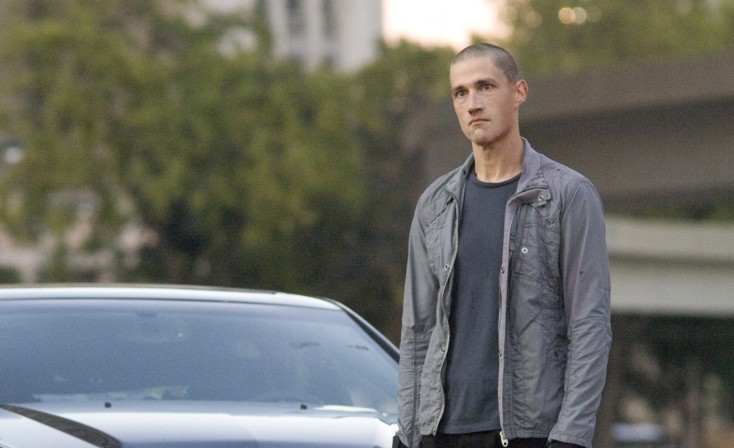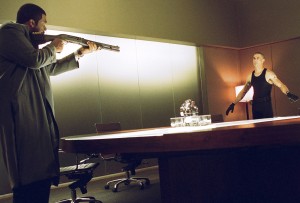By ANGELA DAWSON
Front Row Features
HOLLYWOOD—When “Lost” went off the air, Matthew Fox, who played the heroic doctor Jack Shephard, decided to stay out of the limelight for a while. For a year he went home to Oregon and was simply a husband and father. (He has two children with his wife Margherita.)
The handsome actor is now on the big screen playing a decidedly darker role. He plays a psychopathic killer simply known as Picasso in the reimagining of James Patterson’s bestselling detective series “Alex Cross.” Taking over the role from Morgan Freeman, who portrayed the doctor-turned-detective in two screen adaptations, is Tyler Perry, who like Fox is portraying a character a far cry from his best-known role, the sassy and brassy Madea.
After reading the adapted script by Mark Moss and Kerry Williamson, Fox couldn’t pass up the opportunity to play the ruthless killer. The suspense thriller teamed him with action filmmaker Rob Cohen (“The Mummy: Tomb of the Dragon Emperor,” “The Fast and the Furious”), who he had long wanted to work.
The 46-year-old lost a considerable amount of weight for the gritty role and shaved his head. He also had the added challenge of filming the movie at the same time he was making another film in Europe. Fox welcomed the challenge, though.
Q: Could your character beat Madea?
Fox: (He chuckles) Probably not.
Q: How did you prepare for such a dark role?
Fox: It was a lot of work. It required five months of not eating the things I like to eat, and not having a glass of wine with dinner. (I spent) a lot of time in the gym and (had) just real commitment to it, and I didn’t cheat. The physical weight loss was really challenging. I was always curious about whether I could do something like that, and I proved to myself that I could. That was sort of the way into the role for me.
Q: What made you want to play this very dark, villainous character?
Fox: When Rob (Cohen) called to offer me the role I was in London doing a play there, and after I read the script, that was the image that jumped into my head. I just felt like this guy’s—his philosophical construct that he builds for himself to rationalize his obsessions—would require an enormous amount of energy and would sort of look like that naturally. It would be more of this sort of intensity level in which his mind is working. So that was the image that I had and I felt like I had to go for that. Rob and I talked about it and then I went to work.
Q: Did it take a long time to prepare for this role?
Fox: It took about five months to get there, and then the shooting was just sort of maintaining where I got and there were a couple sequences in the film, like on the houseboat, in his sort of lair, and the cage fighting sequence, where the physical dieting and stuff like that gets ratcheted up a little bit right before those sequences. It was a real challenge and I enjoyed that.
Q: You weren’t always together on set with Tyler for some scenes. Why?
Fox: All of that was driven by the fact that I was shooting another film at the same time. I was working on (Marc Forster’s post-apocalyptic zombie movie)“World War Z” in London and traveling back and forth (to the “Alex Cross” set in Ohio). So I missed a few scenes where it was Tyler’s on-camera stuff of a phone conversation. I really regretted it, but Rob’s really good at that kind of thing and gave (Tyler) what he needed.
Q: You and Tyler didn’t hang out much together off screen.
Fox: We never really made a decision to not communicate with each other. That was really driven by the nature of the film. In the movie, it’s just two guys trying to kill each other so there was never an opportunity for us to have an interaction beyond scenes where we were trying to kill each other. The few moments where it was the mano a mano fight to the death took several days to do and was really exhausting. We did have our moments to just have a quiet conversation. But when you’re playing that stuff, it’s not like you stop and ask how’s the family.
Q: What did you make of Tyler?
Fox: He really brought a lot of good stuff into this film, and the interaction I had with him, the small bit, was really good and very positive and then we went about doing our work.
Q: Was the character you created totally from the script, or did you do some research into real life psychopaths?
Fox: I did watch a lot of stuff. I remember the first time Rob and I talked, he kind of described the guy to me. The first guy that popped into my head was (serial killer) Ted Bundy, mainly because Bundy looked like the last person on earth that would be a serial killer. He came across as someone almost dashing and sort of prototypically handsome and charming. Obviously, the character changed. (He chuckles.) He ended up being a lot more openly psychopathic. So it changes as you’re working on it, but I started by watching a lot of footage and stuff of those guys and trying to figure out what drives them. Then, I think, Picasso became kind of his own thing.
Q: Did you have creative interaction with (author) James Patterson?
Fox: No. I met James during the shooting. He had seen some rushes pretty early on. He was kind enough to stop by with his wife and his son, and he was very positive in reinforcing what I was doing with the guy, and I appreciated that.
Q: How long did it take for you to let go of the character when you finished the movie?
Fox: Not very long. I couldn’t wait, honestly. When we were done shooting, I was emotionally spent. We shot a lot of that movie at night so all the physical demands of what I was doing—exercise and the training stuff that I was doing for the particular sequences in the film and the emotional machinations I had to put myself through—I was pretty beat, and the last few days I remember thinking, I can’t wait to get to the end of this and eat some high carbohydrate foods and go home to my family and sort of slip back into my normal, everyday life.
Q: How did you get back to your normal weight?
Fox: When I got home—my wife’s Italian and a fantastic cook—she makes a particularly good lasagna. She does the béchamel sauce and layers it with peas and meat, and I think it’s just the best lasagna in the world—I kinda have to say that, no?—so getting back (home) and just eating regularly was fantastic. My mother’s Italian too, so when I started losing all the weight, it was really hard for her. Every time she’d see me, she would take a gasp and say, “Can I feed you?” My daughter, who’s 15, said to me, “You’re kind of looking hideous, dad.”
Q: You have a lot of tattoos in this movie. Were they supposed to be Picasso’s artwork?
Fox: Those are actually all mine. (He chuckles.) Rob and I discussed that early on, and you have the option of spending an extra 45 minutes in the makeup trailer every morning and having all that stuff covered, or you have the option of saying, these are going to be Picasso’s. So that was the option we took. I didn’t feel that it was too far of a stretch in the guy that we were creating—he has this obsession with pain and I think it would be something where early on in his life, before his obsession with pain and self-punishment stuff started reaching more and more exaggerated—he always have to satisfy and up what they’re doing—but early on, tattooing would have been an early manifestation of his obsession with pain, not just on other people but he really enjoys it on himself. A lot of the (tattoos) are new since I finished “Lost.”
Q: Did you want to take a role like this because you were surrounded by scene-stealing villains on “Lost?”
Fox: I don’t think so. I don’t remember getting offered a lot of straight up the middle-of-the-road guys before Picasso came along. Honestly, after “Lost” was over, I didn’t really look that much for a year. I kind of wanted to take a break, and the first thing that came along was Neil LaBute’s (“In a Forest, Dark and Deep”), and I’d always dreamed of doing a play in the West End in London. So the first year after “Lost,” was completely focused on that. Then, while I was doing the play, Rob called me directly and said, this is what I’m doing and I really want you to play this role and it really stuck with me. (I thought) this is going to be incredibly challenging. I really felt like we got each other, and we would have a really good time working together, so at the moment, it felt right.






